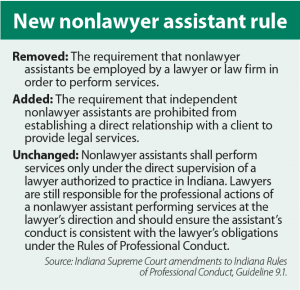Can a Non Lawyer Own a Law Firm?

In the United States, non-lawyers cannot own law firms. Different jurisdictions have varying regulations regarding legal practice ownership.
Table of Contents
Can a Non Lawyer Own a Law Firm? Understanding who can own a law firm is crucial for legal entrepreneurs and investors. Navigating the intricacies of legal practice ownership law demands familiarity with jurisdiction-specific regulations. The American Bar Association and state rules typically restrict law firm ownership to licensed attorneys to maintain professional independence and ethical standards.
These rules ensure that those without a legal background do not influence legal judgment or the attorney-client relationship. Across the world, attitudes towards this matter differ, with some countries like the UK and Australia allowing non-lawyer ownership through Alternative Business Structures. Entrepreneurs looking to invest in the legal sector must consider these regulations and seek opportunities that align with their ambitions while complying with local laws. Legal professionals and investors should always be well-informed about these ownership restrictions before planning any business endeavors within the legal field.
The Traditional Model Of Law Firm Ownership
Exploring the traditional model of law firm ownership, we delve into a world where only certain individuals possess the right to own such establishments. Traditionally, this model has served as the bedrock of legal practice, upholding the industry’s integrity and ensuring that the noble pursuit of law remains untainted by external business influences.
Ethical Foundations: Who Can Own A Law Firm?
Law firm ownership is not a free-for-all endeavor. The ethical foundations are clear and strict. Only those with a license to practice law — the attorneys themselves — have the gatekey to firm ownership. This requirement is not arbitrary but is rooted in the core values of legal practice. Protection of client interests, confidentiality, and professional independence are non-negotiable in the eyes of the bar associations that regulate the industry. Thus, ownership is a privilege tightly coupled with the responsibility of legal licensure.
Rationale Behind Restrictions On Ownership
The rationale for these ownership restrictions is manifold. They prevent conflicts of interest and ensure a steadfast focus on client welfare. Non-legal entities or individuals, uninhibited by professional oaths and ethical codes, could prioritize profit margins over legal accuracy or client need. Furthermore, unnecessary litigation might be encouraged for financial gain at the expense of justice.
- Maintaining ethical legal practice
- Protecting client interests above profits
- Preventing frivolous or unnecessary litigation
- Ensuring independence of professional judgment
Global Perspectives On Law Firm Ownership
Law firm ownership rules vary worldwide. Some countries maintain strict boundaries, while others adopt flexible policies. This portion of the blog explores diverse international regulations and innovative approaches shaping the legal industry’s future.
Comparative Analysis Of Law Firm Ownership Laws
Different nations enforce distinctive laws regarding who can own a law firm.
- Most jurisdictions require lawyers to hold majority ownership.
- Some countries permit external investors but with conditions.
- Law firm governance and profit-sharing policies also exhibit international variance.
In exploring these laws, patterns and outliers become evident, painting a global picture of the legal landscape.
Countries Breaking The Mold: Uk And Australia’s Approach
The UK and Australia permit non-lawyers to own law firms, spearheading progressive policies.
| Country | Regulatory Body | Ownership Rule |
|---|---|---|
| United Kingdom | Solicitors Regulation Authority (SRA) | Legal Services Act 2007 allows Alternative Business Structures (ABS) |
| Australia | Legal Services Boards and Commissioners | Incorporated Legal Practices (ILPs) and Multi-Disciplinary Practices (MDPs) |
These pioneering frameworks allow for greater innovation, investment, and multi-disciplinary collaboration within legal services.

The Debate: Pros And Cons Of Non-lawyer Ownership
Opening a law firm where lawyers are not the sole owners stirs debate. This practice varies globally and attracts strong views. Supporters see potential in diversity. Critics worry about professionalism and ethical standards. Let’s explore the advantages and challenges this model presents.
Potential Benefits Of Diverse Ownership
Non-lawyer ownership of law firms offers notable advantages:
- Innovation: Fresh perspectives fuel creativity.
- Management Skills: Diverse skills improve firm operations.
- Access to Capital: Easier investment means growth opportunities.
- Cross-disciplinary Expertise: Varying expertise enhances client services.
Risks And Criticisms Associated With Non-lawyer Owners
Non-lawyer ownership raises concerns:
- Ethical Dilemmas: The business-first mindset could challenge professional ethics.
- Priority Shift: Profit may overshadow client welfare.
- Lack of Legal Expertise: Leaders might miss nuanced legal implications.

Credit: www.theindianalawyer.com
Legal Innovations And Alternative Business Structures
The legal industry is currently undergoing a transformation. Alternative Business Structures (ABS) are at the forefront of this change. Traditionally, law firms have been owned and managed solely by lawyers. ABS is challenging this custom.
Emergence Of Abs In The Legal Industry
The concept of ABS gained momentum with regulatory changes. This allows non-lawyers to own or invest in law firms. It began in countries like the UK and Australia. ABS intends to promote innovation and improve accessibility to legal services.
How Abs Are Reshaping The Future Of Legal Services
ABS could redefine how legal services are offered. They allow for a blend of professional knowledge across different fields. ABS brings in expertise from various sectors. This leads to more efficient and client-focused services.
- Integration of technology
- Diverse management teams
- Increased access to capital for innovation
- Broader range of services
This shift paves the way for greater interdisciplinary collaboration. Law firms can now deliver more holistic solutions to their clients.

The Impact On The Legal Landscape
The legal industry stands at a crossroads with the question: Can a non-lawyer own a law firm? This shift could redefine professional service boundaries and client experiences. Here, we will explore the potential effect of this change on the legal landscape.
Market Dynamics And Consumer Access To Justice
Opening legal firm ownership to non-lawyers could significantly alter market dynamics.
- Increase in competitive practices: More players may mean more competitive rates.
- Enhanced innovation: Non-lawyer ownership might infuse new technologies and business strategies.
- Consumer benefits: Clients could experience improved access to legal services.
New ownership models could broaden legal access, especially for underserved communities. Alternative services may emerge, reducing legal costs and demystifying legal assistance.
Future Implications For Traditional Law Practices
The idea of non-lawyers owning law firms might prompt significant changes for traditional practices.
- Shift in management styles: Traditional law firms could adopt more corporate management approaches.
- Pressure to innovate: Established firms may face pressure to innovate services and client relations.
- Collaborative approaches: We might see increased collaborations between lawyers and professionals from other sectors.
Embracing diverse ownership could lead to sharpened business acumen within law firms, propelling the industry forward.
Navigating The Legalities Of Ownership
Navigating the Legalities of Ownership in the legal sector is a complex task. Understanding who can hold equity in a law firm is critical. Amid evolving business structures, a common question arises: Can a non-lawyer own a law firm? This exploration delves into the regulations that frame law firm ownership and the ways non-lawyers might be involved in firm management.
What The Rules Say: A Closer Look At Aba Model Rules
The American Bar Association (ABA) Model Rules offer a blueprint for law firm operations and ownership. Strict criteria ensure ethical practice within the legal field. Rule 5.4, in particular, addresses professional independence. It currently restricts non-lawyer ownership to maintain this independence.
Certain states refer directly to these model rules, while others adapt them. Understanding specific state deviations is necessary for a clear picture. Table 1 below highlights disparities across varying jurisdictions:
| State | Adherence to ABA Rule 5.4 |
|---|---|
| California | Limited |
| New York | Full |
| Washington DC | Partial |
How Non-lawyers Can Participate In Law Firm Management
Non-lawyers often bring crucial business skills to law firms. While direct ownership is typically off-limits, alternatives exist.
- Professional Service Corporations (PSC) may allow non-lawyer roles in governance.
- Management roles can benefit from non-lawyer expertise without equity exchanges.
- Operational positions keep the firm functioning smoothly, separate from legal judgment calls.
Innovation in legal services hints at future changes in ownership laws. Entities like Alternative Business Structures (ABS) in the UK demonstrate global shifts in legal practice.
Interested parties must keep abreast of state-specific legislation and court rulings. Keeping informed ensures compliance while optimizing law firm structure.

Credit: chicagoaccidentlawyer.com
Conclusion
Navigating the complexities of law firm ownership can be challenging for non-lawyers. Nevertheless, with strategic alliances and compliant structures, they too can participate in the business arena of legal services. Always ensure you’re adhering to the regulations of your jurisdiction.
Exploring this possibility requires due diligence and professional guidance to succeed in a field traditionally reserved for licensed attorneys.
Amelia Justiceberg, a distinguished legal luminary, thrives on the intersection of empathy and legal acumen. As a prominent family law attorney, she orchestrates compassionate resolutions amidst complex dynamics. Justiceberg's courtroom finesse and dedication to fairness define her practice. Beyond litigation, she ardently advocates for social justice, solidifying her reputation as an influential force in the legal landscape.






